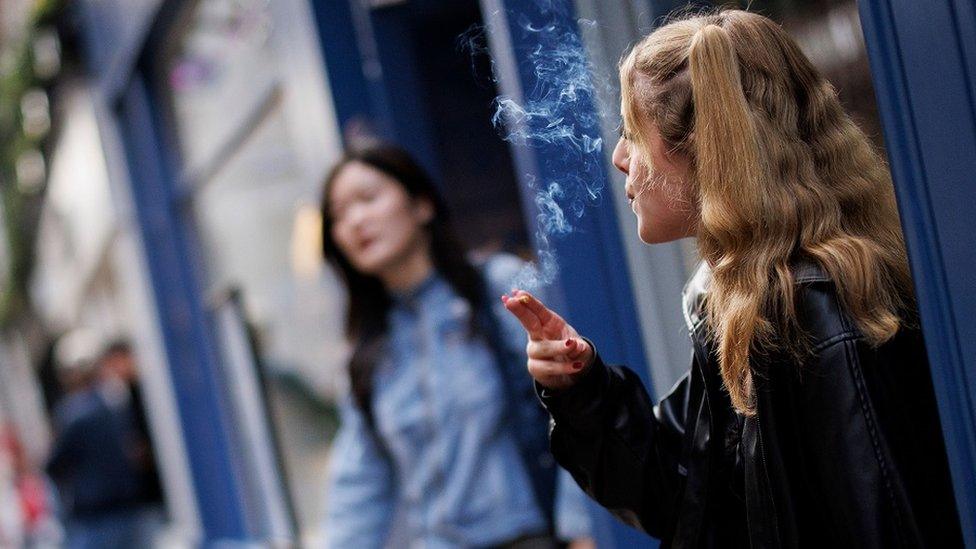UK smoking ban for those born after 2009 starts journey into law
- Published

Rishi Sunak's plan to ban anyone born after 2009 from buying cigarettes is starting its journey into law.
The means anyone turning 15 this year, or younger, will never legally be sold cigarettes.
The government says smoking itself will not be criminalised, so anyone who can legally buy tobacco now will not be prevented from doing so in future.
But if the bill is passed it will give the UK some of the world's toughest anti-tobacco laws.
It will effectively raise the legal age people can buy cigarettes by one year every year, with the aim of stopping today's young people from taking up the habit in the first place.
The legislation has now been published, and formally introduced in Parliament. A date when MPs will begin debating it is yet to be announced.
The draft law also contains powers that will allow ministers to introduce restrictions on vape flavours and packaging intentionally marketed at children.
This could change how vapes, which contain nicotine, are displayed in shops, moving them out of sight of children and away from other products such as sweets.
Figures show that one in five children has tried vaping despite it being illegal to sell vapes to under-18s, while the number of children using vapes has tripled in the past three years.
'Nanny state'
Other powers in the Tobacco and Vapes Bill mean shops that fail to clamp down on underage sales of tobacco and vapes will be given 拢100 on-the-spot fines.
This is in addition to the maximum 拢2,500 fine that local councils can already impose. It will also be illegal for retailers to give free samples of vapes to under-18s.
Separately, the government has committed to ban disposable vapes from April 2025 under environmental laws.
Conservative MPs will get a free vote on it - meaning they will not be told which way to vote by party bosses - and some are expected to oppose it.
But the bill is almost certain to become law later this year, because Labour is backing the ban.
Earlier, this year, former Prime Minister Liz Truss said: "A Conservative government should not be seeking to extend the nanny state. It only gives succour to those who wish to curtail freedom."
Another former leader, Boris Johnson, has previously criticised the plans as "barmy," arguing the 2009 cut-off will lead to a "smoking apartheid," with some adults allowed to carry on buying cigarettes and others not.
'Reduce illness'
But Rishi Sunak, who announced the plan last year, said tackling smoking would save lives and billions of pound for the NHS.
"If we want to build a better future for our children we need to tackle the single biggest entirely preventable cause of ill-health, disability and death: smoking," he said.
"That is why, alongside new measures to curb the alarming rise in youth vaping, we are delivering on our commitment to create a smoke-free generation and stop our kids from getting hooked on harmful cigarettes and other nicotine products."
England's chief medical officer, Professor Chris Whitty, said: "If passed this will be a major public health measure which reduce illness, disability, and premature deaths for children today and future generations.
Speaking to 成人快手 Radio 4's World At One, Professor Whitty said there was a "high probability" vaping is "significantly safer only because smoking is so dangerous".
The law was aiming to "get a balance" between making vapes "much less attractive children and indeed non-smokers but also make it possible for smokers to use them as a quitting aid".
Smokers' rights group Forest, which is funded by the tobacco industry, said: "No-one wants children to smoke, but the idea that government should take away people's freedom to choose long after they have grown up is absurd."
The UK government's plan to phase out tobacco sales is based on a similar scheme in New Zealand, which has since been scrapped.